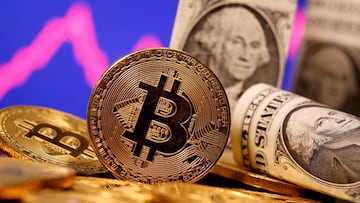What businesses accept payment with cryptocurrencies in the US?
More businesses are opening up to letting customers pay with cryptocurrencies as new systems make it easier to instantly collect payments in fiat dollars.

Unlike the cash or credit cards you carry around in your wallet using cryptocurrencies for day-to-day transactions isn’t straightforward. For those merchants that don’t want to hold onto digital coins some payment platforms have solved the problem.
One major reason that cryptocurrencies aren’t widely accepted for payment is that they can be a risky asset to have with the frequent fluctuations in value. That has been shown once again recently with Bitcoin, the dominant cryptocurrency dropping to its lowest level since last summer.
Also see:
- Virtual real estate for sale in the metaverse
- How do NFTs hurt the environment?
- How are NFT digital artworks made?
- How much has Bitcoin devalued since its all-time high?
- President Biden plans action on regulating cryptocurrencies
The pros and cons of cryptocurrencies
Digital currency advocates hail the digital payment system as an alternative means of transferring funds for those who don’t have access to traditional banks. They see cryptocurrencies as the future of financial transactions.
For businesses there is the advantage of lower fees than credit cards which is important for merchants operating on a tight margin. Also, digital coin transactions only go in one direction and can’t be cancelled. With credit cards, a credit-card provider can demand a retailer cover the loss on a fraudulent or disputed transaction. That doesn’t mean that a customer can’t demand a refund but venders have more control.
Investors fear the crypto “winter” isn’t over as cryptocurrency prices keep tumbling https://t.co/1GYWQBBoFe
— Forbes (@Forbes) January 28, 2022
For the customer though a credit card provides protections against fraudulent activity that are non-existent with digital currencies. Digital currencies have protections to make them extremely difficult to hack, but crypto exchanges can be vulnerable to hacking.
Digital currency transactions are also slower than cash or credit card payments. The former can take up to ten minutes or more depending on network activity and the network's current hashrate as opposed to a matter of seconds for a credit card payment. Third-party payment platforms such as PayPal, Flexa, BitPay, Bakkt and Coinbase have been developed which allow cryptocurrency holders to covert their digital coins into fiat money to pay merchants.
There is also the environmental impact of cryptocurrencies from the high energy consumption they require. Much of the mining of new coins, the process used to validate the transactions, is done in China where energy is cheaper but much dirtier because it is supplied by burning coal.
A group of Democratic lawmakers led by U.S. Senator Elizabeth Warren is demanding details from six of the world’s biggest Bitcoin miners about their electricity consumption and greenhouse-gas emissions. https://t.co/QYJLgk4dPR
— FORTUNE (@FortuneMagazine) January 28, 2022
Businesses that accept payment with cryptocurrencies
The exact number of small businesses that accept cryptocurrency payments in the US ranges from 19 percent to at least a third. Generally newer, more tech-savvy businesses are willing to take digital money like Bitcoin but some large, established companies do too.
Overstock
Overstock.com became the first major retailer to accept Bitcoin as payment in January 2014 by partnering with Coinbase.
Microsoft
Microsoft also began accepting Bitcoin in 2014 allowing customers to top up their Microsoft account. Additionally, the digital currency can be used to pay for Xbox Live, Microsoft apps, games, and other digital content.
Newegg
There is no need to convert crypto coins to fiat cash for customers shopping at Newegg. The online electronics giant allows payment with Bitcoin by choosing the “Pay With Bitcoin'' option at the checkout. Customers will receive a QR code to scan to make the payment.
Salvadorans show support for bitcoin despite IMF criticism https://t.co/rQtPs2ELdn
— Intl. Business Times (@IBTimes) January 28, 2022
Twitch
Twitch adopted crypto payments in 2014. The game streaming video platform allows customers to pay with a number of different cryptocurrencies.
Amazon
Amazon, which owns Twitch, doesn’t accept direct payments with digital currency but customers are allowed to use Purse.io where they exchange cryptocurrency for gift cards people are trying to off load.
Tesla
Elon Musk announced last year that Tesla would accept Bitcoin as payment for its vehicles but reversed course a few months later. The move was due to his concerns over the digital currency’s carbon footprint.
In another about-face Musk recently announced that Tesla will accept Dogecoin for a limited number of items the company.
Starbucks
Starbucks customers can use Bitcoin to top up their account via the coffee company’s app through the third-party digital wallet application, Bakkt.
AT&T
Using the third-party payment platform BitPay, AT&T now provides customers with a crypto payment option.
Stores that accept Flexa
Related stories
In 2019, a new payment system was developed called Flexa that allowed paying with digital currencies to piggy-back on existing digital scanners that were already used to accept phone-based payments. Cryptocurrencies are converted immediately into fiat dollars when a customer pays at the register. Customers need the Spedn app in order to pay with a variety of digital coins.
Some of the early takers were GameStop, Home Depot, Nordstrom and Whole Food’s among others.
- Bitcoin
- GameStop
- The Home Depot
- Starbucks
- Twitch
- Tesla Motors
- E-money
- Amazon
- Currency
- Online payments
- Tiendas online
- Digital Platforms
- Money
- Televisión IP
- Car manufacturers
- Vehicles
- Payment methods
- Video games
- Car industry
- Trade
- Internet
- Enterprises
- Television
- Leisure
- Economy
- Lifestyle
- Media
- Transport
- Communications
- Finances
- Industry
- Communication
- Telecommunications


